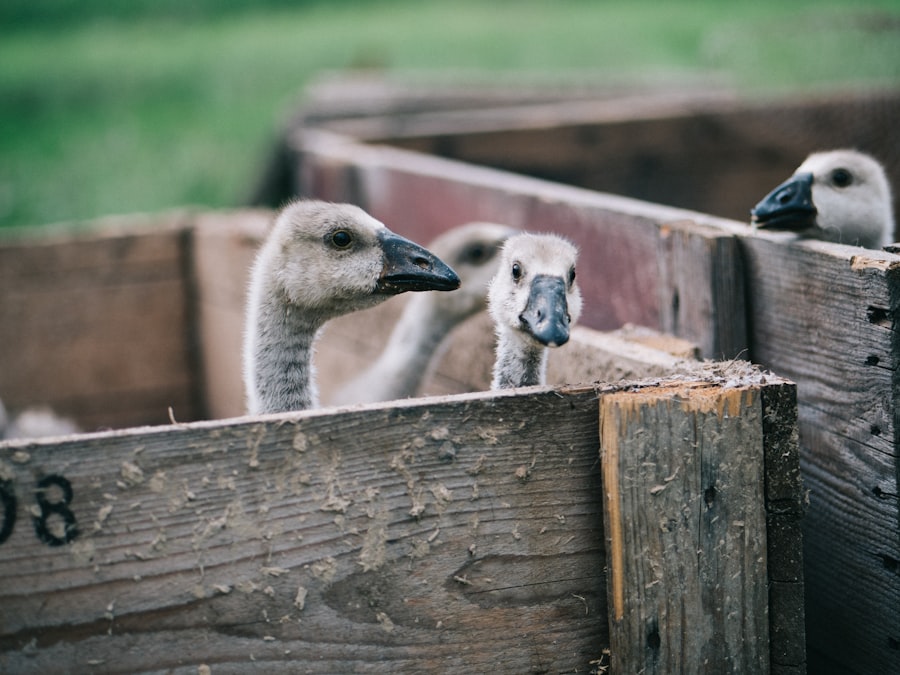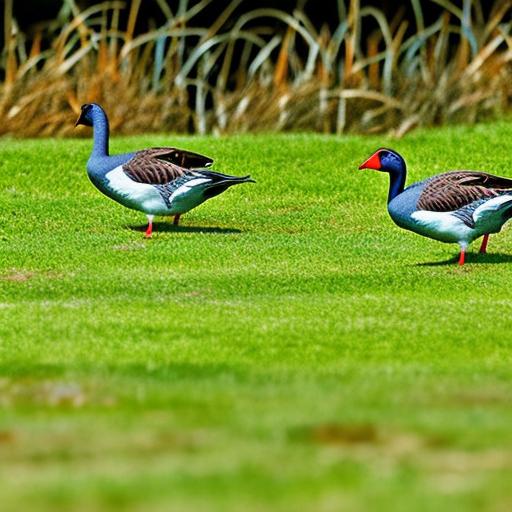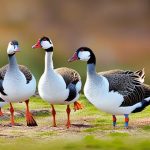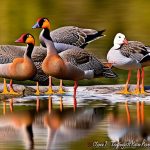Having geese on your lawn can be a nuisance. They leave behind droppings that can be unsightly and difficult to clean up. Additionally, their constant grazing can damage your grass and plants. If you’re tired of dealing with geese on your property, there are several solutions you can try. In this post, we will discuss different methods to deter geese from your lawn, including natural deterrents, physical barriers, decoys, sound and light-based solutions, landscaping techniques, creating a water source away from your grass, maintaining a clean and tidy lawn, consistent goose management, and seeking professional help when needed.
Key Takeaways
- Geese are social animals and tend to congregate in large groups.
- Natural deterrents for geese include planting certain types of vegetation and using predator urine.
- Physical barriers such as fences and netting can be effective in keeping geese away.
- Decoys that resemble predators or other geese can scare geese off your grass.
- Sound and light-based solutions such as noise makers and strobe lights can also be effective in goose control.
Understanding the behavior of geese
To effectively deter geese from your lawn, it’s important to understand why they are attracted to it in the first place. Geese are attracted to lawns because they provide easy access to food and water. They graze on grass and plants, and they also enjoy the proximity to bodies of water such as ponds or lakes. Geese are social animals and tend to gather in large groups, so if one goose finds your lawn appealing, others are likely to follow.
Geese have certain behaviors and habits that make them difficult to deter. They are creatures of habit and tend to return to the same locations year after year. They also have a strong homing instinct, which means they will remember where they have nested in the past and return to those areas. Geese are also protective of their young and can become aggressive if they feel threatened. Understanding these behaviors can help you choose the most effective deterrents.
Natural deterrents for geese
One way to deter geese from your lawn is by using natural deterrents. Certain types of grass or flowers can be planted to make your lawn less appealing to geese. For example, tall fescue grass is unpalatable to geese because of its coarse texture. Planting this type of grass can discourage geese from grazing on your lawn. Another natural deterrent is the use of certain flowers, such as marigolds or daffodils, which geese find unappealing.
These natural deterrents work by making your lawn less attractive to geese. By planting grass or flowers that geese don’t like, you can discourage them from grazing on your lawn. Additionally, these deterrents can add beauty to your landscape and provide other benefits, such as attracting beneficial insects or pollinators.
Physical barriers to keep geese away
Another effective way to deter geese from your lawn is by using physical barriers. Fences or netting can be installed to create a barrier between your lawn and the geese. These barriers should be at least three feet high to prevent the geese from jumping over them. Additionally, the bottom of the fence or netting should be buried in the ground to prevent the geese from going under it.
Installing and maintaining physical barriers requires some effort, but it can be an effective way to keep geese away from your lawn. Regular inspections and repairs may be necessary to ensure that the barriers remain intact and effective. It’s also important to note that physical barriers may not be suitable for all properties, especially if you have a large area of land or if there are other access points for the geese.
Using decoys to scare geese off your grass
Decoys can be an effective way to scare geese off your grass. There are different types of decoys available, including plastic or wooden replicas of geese or other predators such as owls or coyotes. These decoys can be placed strategically around your lawn to create the illusion of a predator presence.
To use decoys effectively, it’s important to move them regularly so that the geese don’t become accustomed to their presence. Geese are intelligent animals and can quickly learn that the decoys are not a threat if they remain in the same position for too long. By moving the decoys regularly, you can create the impression of a predator that is actively patrolling the area.
Sound and light-based solutions for goose control

Sound and light-based solutions can also be effective in deterring geese from your lawn. Noise machines that emit loud sounds or distress calls can startle geese and make them uncomfortable. Strobe lights or other types of flashing lights can also be used to create a visual deterrent.
To use sound and light-based solutions effectively, it’s important to vary the patterns and frequencies of the sounds or lights. Geese can become habituated to repetitive sounds or lights, so it’s important to change them regularly to maintain their effectiveness. Additionally, it’s important to consider the impact on your neighbors when using these solutions, as they can be disruptive if not used responsibly.
The benefits of landscaping to deter geese
Landscaping can play a significant role in deterring geese from your lawn. By strategically planting trees, shrubs, or other types of vegetation, you can create barriers or obstacles that make it difficult for geese to access your lawn. For example, planting dense shrubs along the perimeter of your property can create a physical barrier that geese are less likely to cross.
In addition to creating barriers, landscaping can also make your lawn less attractive to geese by providing alternative food sources. Planting native plants or creating a wildflower meadow can attract insects or other small animals that geese feed on. By providing these alternative food sources, you can reduce the likelihood that geese will graze on your lawn.
Creating a water source away from your grass
Geese are attracted to lawns because they provide easy access to water. By creating a water source away from your grass, you can make your lawn less appealing to geese. This can be done by installing a small pond or water feature in another area of your property.
To create a water source, you will need to dig a hole and line it with a pond liner. You can then fill the hole with water and add aquatic plants or other features to make it more attractive to wildlife. It’s important to maintain the water source regularly to prevent it from becoming stagnant or attracting mosquitoes.
Maintaining a clean and tidy lawn to discourage geese
Geese are attracted to lawns that provide easy access to food and water. By maintaining a clean and tidy lawn, you can reduce the likelihood that geese will be attracted to your property. This includes regularly removing fallen leaves, grass clippings, or other debris that can provide food for geese.
It’s also important to remove any standing water or puddles from your lawn, as these can attract geese. Additionally, you should regularly mow your grass to keep it short and prevent it from becoming an attractive grazing area for geese.
The importance of consistent goose management
Consistent goose management is important to effectively deter geese from your lawn. Geese are creatures of habit and tend to return to the same locations year after year. By consistently implementing deterrents and maintaining your property, you can reduce the likelihood that geese will choose your lawn as their nesting or feeding area.
Consistency is key when it comes to goose management. It’s important to regularly inspect your property for signs of geese and take action immediately if they are present. By consistently implementing deterrents and maintaining your property, you can create an environment that is less attractive to geese.
Seeking professional help for persistent geese problems
If you have tried various deterrents and are still experiencing persistent geese problems, it may be time to seek professional help. There are professionals who specialize in goose management and can provide expert advice and assistance. They can assess your property, identify the reasons why geese are attracted to it, and recommend the most effective solutions.
When seeking professional help, it’s important to choose a reputable company or individual with experience in goose management. They should be knowledgeable about the behavior and habits of geese and have a proven track record of success in deterring them from properties.
Dealing with geese on your lawn can be frustrating, but there are several solutions you can try. From natural deterrents to physical barriers, decoys, sound and light-based solutions, landscaping techniques, creating a water source away from your grass, maintaining a clean and tidy lawn, consistent goose management, and seeking professional help when needed, there are many options available. It may take some trial and error to find what works best for your property, but with persistence and patience, you can successfully deter geese from your lawn.
If you’re interested in learning more about keeping ducks and how to deal with their mating season, you might also find this article on “When is Duck Mating Season?” from Poultry Wizard informative. It provides valuable insights into the breeding habits of ducks and offers tips on how to manage their mating behavior. Understanding the mating season can help you better care for your ducks and ensure their well-being. Check out the article here.
FAQs
What are geese?
Geese are waterfowl birds that belong to the family Anatidae. They are known for their long necks, webbed feet, and distinctive honking calls.
Why do geese come onto my grass?
Geese are attracted to grassy areas because they provide a source of food and a place to rest. They are also drawn to areas near water, such as ponds or lakes.
What problems can geese cause on my grass?
Geese can cause a number of problems on grassy areas, including excessive droppings, damage to the grass from grazing, and aggressive behavior towards people or pets.
How can I keep geese off my grass?
There are several methods for keeping geese off your grass, including using decoys, installing fencing or netting, using repellents, and modifying the landscape to make it less attractive to geese.
What are some natural repellents for geese?
Some natural repellents for geese include planting certain types of vegetation, such as tall grasses or shrubs, using predator decoys, and using noise-making devices, such as wind chimes or bells.
Are there any humane ways to deter geese?
Yes, there are several humane ways to deter geese, such as using visual deterrents, such as reflective tape or balloons, or using non-toxic repellents, such as grape extract or hot pepper spray. It is important to avoid using harmful or lethal methods to deter geese.
Meet Walter, the feathered-friend fanatic of Florida! Nestled in the sunshine state, Walter struts through life with his feathered companions, clucking his way to happiness. With a coop that’s fancier than a five-star hotel, he’s the Don Juan of the chicken world. When he’s not teaching his hens to do the cha-cha, you’ll find him in a heated debate with his prized rooster, Sir Clucks-a-Lot. Walter’s poultry passion is no yolk; he’s the sunny-side-up guy you never knew you needed in your flock of friends!







